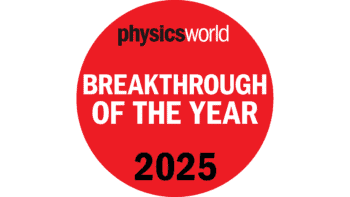Researchers in the US and Greece have invented a reactor that can produce hydrogen from ethanol. Lanny Schmidt of the University of Minnesota, Xenephon Verykios of the University of Patras and co-workers say their reactor is both efficient and cost-effective, and that it represents a major step towards a realistic “hydrogen economy”. It could be employed in small fuel cells capable of generating enough hydrogen for 350 Watt-hours of electricity (G Deluga et al. 2004 Science 303 993).

Fuel cells burn hydrogen to produce electrical energy, with water as the only by-product. However, most of the hydrogen used in fuel cells is produced from natural gas, which means that the energy is not clean. “Hydrogen makes no sense unless it comes from renewable fuels because fossil fuels inevitably produce carbon dioxide,” says Schmidt. “Ethanol is an available and efficient store of renewable energy.”
Ethanol made from corn has already been used to power some car engines, but the process is only 20% efficient. Moreover, all traces of water must be removed before the ethanol can be used as a fuel, which adds to processing costs. Now, the Minnesota-Patras team says that if ethanol was used to make hydrogen for fuel cells, the process would be 60% efficient and the ethanol would not need to be pure.
Schmidt and colleagues passed an ethanol-water-air mixture over a porous metal catalyst containing rhodium. The reaction on the rhodium surface heated the catalyst to 800°C and produced a mixture of hydrogen, recyclable carbon dioxide and some minor by-products in a few milliseconds. The conversion rate of ethanol to hydrogen was over 95%. Furthermore, the process minimized the build up of carbon – normally observed when ethanol burns – that would have deactivated the fuel cell. This allowed the reactor to operate for as long as 30 hours.
The team believe that it should be possible to produce five molecules of hydrogen for every molecule of ethanol – rather than four as at present – once the process has been optimised. Electricity from a perfect fuel cell would cost only $0.04 per kilowatt-hour says the team, and the first applications could include small remote and portable devices.



